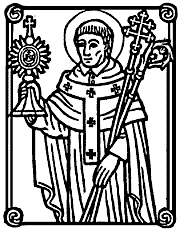St. Norbert
St. Norbert
 The early years of St. Norbert
The early years of St. NorbertSt. Norbert was born of noble parents around the year 1080 in Xanten (northern Rheinland). Already as a small child he was promised to the Cathedral Chapter of St. Victor in Xanten where he was later ordained subdeacon. Norbert's gifts and charm brought him to the courts of Archbishop Frederick of Cologne and Emperor Henry V. Norbert led a worldly life at court. In the year 1111 he was profoundly shocked by the kidnapping of Pope Pascal II by the Emperor, but continued to drift spiritually until the year 1115 when he was thrown from his horse and nearly killed in a violent thunderstorm. He interpreted this as an invitation from God to repent and immediately began to lead the life of a penitent, barefoot and dressed in sheepskin. Ordained to the diaconate and priesthood on one and the same day by Archbishop Frederick, he wandered about the countryside, often barefoot in the snow, preaching the world of God with fire and railing against the abuses of the clergy. Criticized and persecuted by members of the hierarchy, Norbert sought approval for his preaching from Pope Gelasius II and later, Pope Calixtus II. But Calixtus also encouraged him to settle and found a religious community in the diocese of Laon north of Paris.
St. Norbert founds his Order
There, in the desolate valley wilderness of Premontre (Pray-mon-TRAY), in the year 1121, Norbert laid the foundations for his religious Order. He chose the rule of St. Augustine as the guiding light for the new community, becoming one of the most avid Augustinian reformers of the day. The community was marked by its austerity of life, its poverty, its intense liturgical life of prayer and, above all, its complete fidelity to the ideal of community life as depicted in the Augustinian rule. In the meantime Norbert continued to preach and attracted many men and women to the lifestyle of the new Order. The deep faith in the Eucharistic Christ which Norbert and his early disciples exhibited and preached was responsible for spiritual renewal and the defeat of certain widespread errors of the day.
The later years of St. Norbert
On July 25, 1126, Norbert was ordained archbishop of Magdeburg and relinquished the leadership of his Order to begin the work of shepherding the vast diocese on the northeastern frontier of the German Empire. During his years as archbishop, Norbert fought mightily for the freedom of the church against secular princes and proved himself an ardent champion of the cause of the Roman Pontiff. He was instrumental in the downfall of the antipope Anacletus II and the return of Pope Innocent II to his throne. Weakened by his travels and labors, and probably by malaria contracted at Rome, Norbert returned to Magdeburg where he died on June 6, 1134. To this day the universal Church and the Norbertine Order celebrate his feast on June 6. St. Norbert is usually depicted with the double-runged cross and pallium of an archbishop and with a chalice or monstrance which recalls his Eucharist-centered spirituality.
According to the words of Pope John Paul II
The Norbertines of today are called by God in the spirit of St. Norbert to:
- Live united in liturgical prayer, personal contemplation and apostolic involvement
- Be authentic and concrete in witnessing to values which are eternal and transcendent
- Give an example of austerity and a serious religious life
- Make the Holy Sacrifice of the Mass the source of their strength and happiness
- Hold high the Eucharist over all the miseries and errors of this world
- Bring truth, certainty and love to the people of today, binding them closely to the Eucharistic Jesus
- Be ever faithful to the Catholic Church
- Remain closely united to the Church hierarchy, and listen, like St. Norbert, to the living voice of the Successor of St. Peter
- Understand and love the people among whom they live and to witness with joy and courage to the Gospel message of salvation
- Foster in everyone love for the holy Virgin Mary.

